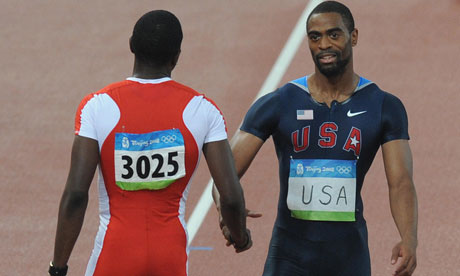
If you think shaking hands is a friendly gesture, think again. It is an infection hazard, or so said the British Olympic Association's chief medical officer last week. Since infections are spread by shaking hands, Dr Ian McCurdie said the practice was best avoided. An Olympic athlete, he warned, could lose out on a medal by catching even a mild disease.
McCurdie is not alone in stressing the importance of hand hygiene. The World Health Organisation says washing hands would probably cut deaths from diarrhoeal disease by half. The problem is that people don't wash their hands properly after going to the toilet, taking the bin out, preparing food, sneezing, using public transport and other mucky activities.
Dirty hands can transmit infections such as noroviruses and salmonella that cause diarrhoea and vomiting, rhinoviruses that can give you a cold, as well as the viruses that cause flu and chickenpox. Diseases that spread rapidly and can be fatal, such as methicillin-resistant Staphylococcus aureus (MRSA) and Clostridium difficile, can also lurk on hands. The bugs can stay on them for hours and be transferred to surfaces and door handles for other people to share.
In 2009, when researchers from the London School of Hygiene and Tropical Medicine swabbed the hands of 308 commuters in the UK, between four and 19% were contaminated with faecal bacteria. Shaking hands with them would not mean an automatic stomach bug – they would have to carry bacteria capable of causing an infection (such as E coli) and you would have to swallow that bug by sticking your fingers in your mouth. But if you are an elite athlete and not near soap and water, should you keep your hands to yourself? Or should you go for air-kissing instead (safe as long as no one sneezes)?
Solution
In reality, shaking hands may not be that risky. A US study by Johns Hopkins Bloomberg School of Public Health looked at the risk of catching a bacterial infection such as MRSA by shaking hands at a graduation ceremony. They swabbed hands before and after graduation and estimated that one full-blown infection was caught for every 5,209 handshakes. They point out that contact was brief and the bacteria isolated from the swabs were less virulent than those in hospitals.
The message is that we should wash our hands more thoroughly. Use soap and water, rub your hands together to make a lather and scrub between your fingers and under your nails. The process should take the equivalent of two sing-throughs of Happy Birthday. You should dry them thoroughly afterwards. If you use an alcohol-based spray or gel, you need one with 60% alcohol.
Athletes should also avoid borrowing mobile phones. One in six is contaminated by faecal bugs, say researchers from the London School of Hygiene and Tropical Medicine.

